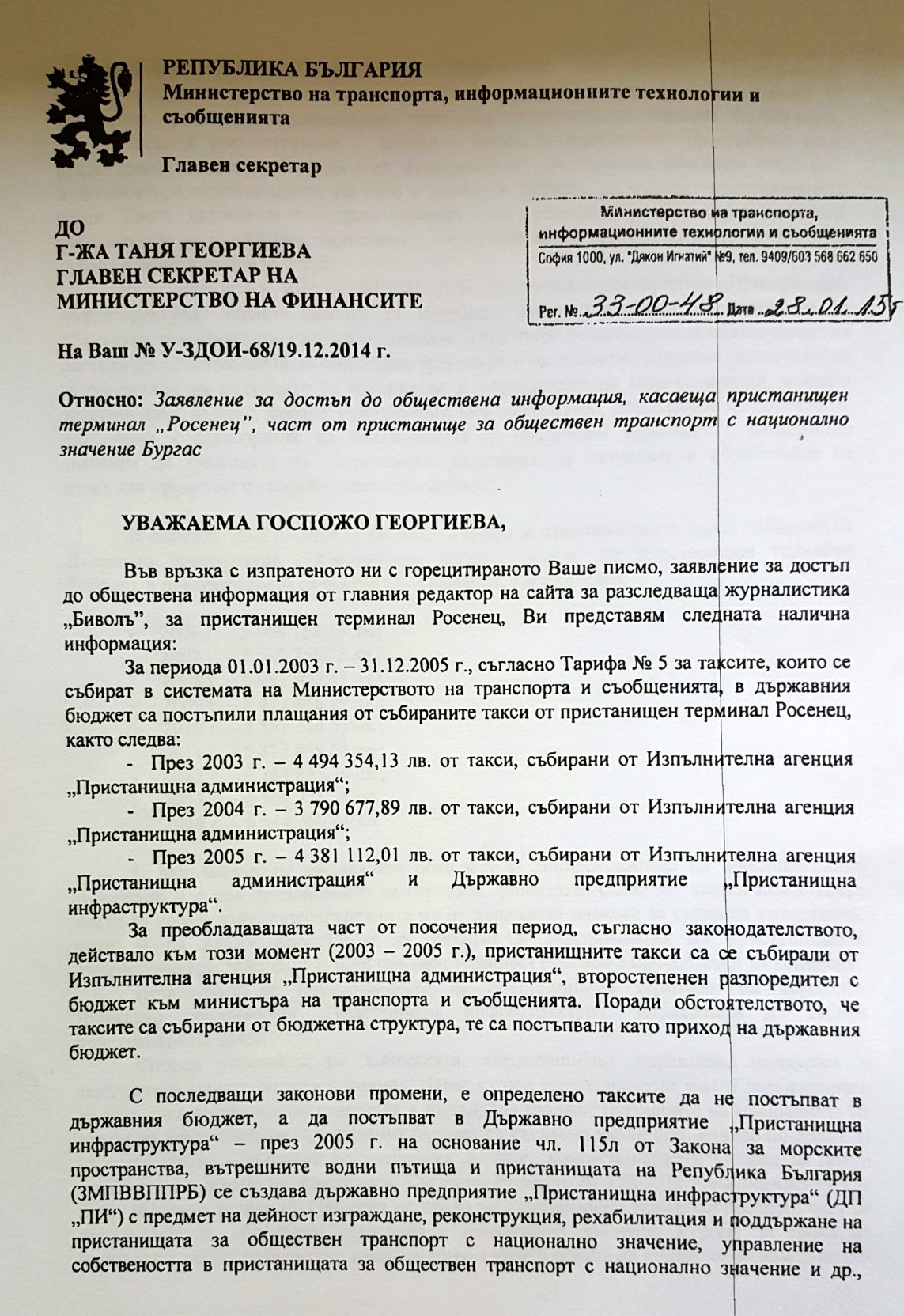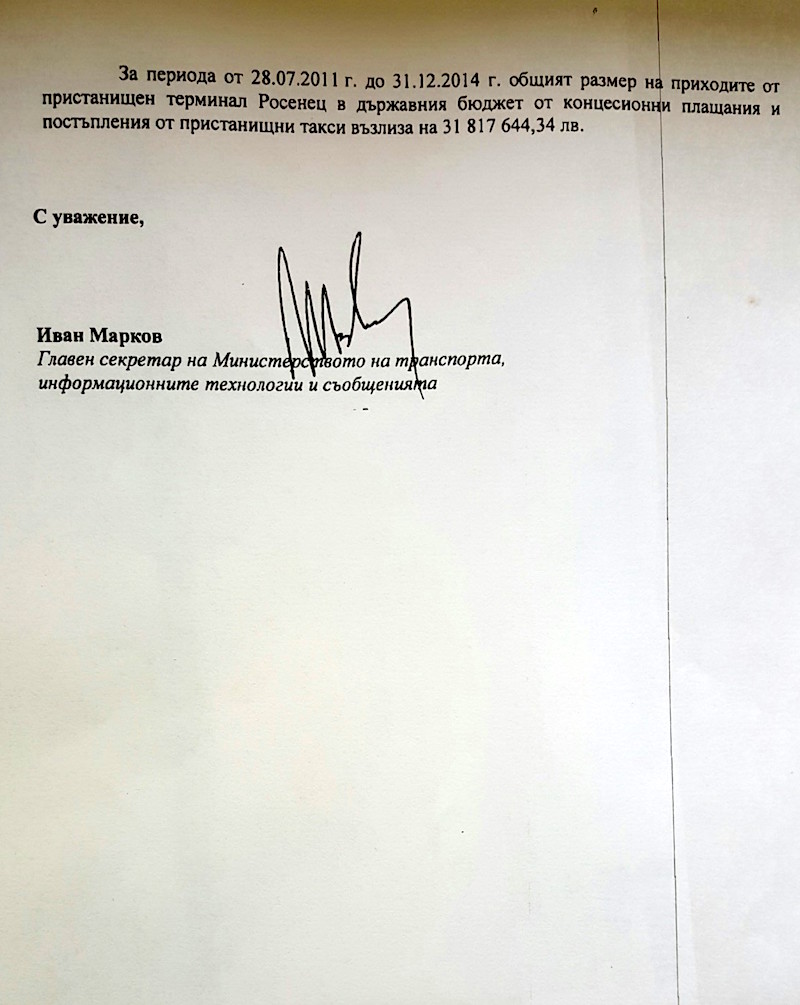The concession fees which Bulgaria has received from Lukoil for port “Rosenets” for the period since July 2011 until 2014, amount to around 860,000 euro per year. The port fees have remained at almost the same level before and after the concession granted by the first government Borisov in 2011, according to data from the Ministry of Transport, requested by Bivol under the Access to Public Information Act (APIA).
The file on this matter was delayed for months as the Ministry of Finance and Ministry of Transport could not agree who should send the answer. Eventually, it was received by the Ministry of Transport and Information Technology.
According to the attached reference, the concession fee consists of a fixed and variable concession payment. Contributions are made twice a year – in January and July. Penalties, whose amount is not known, have also accrued in 2013. In three and a half years, a total of 6 728 211.10 levs from the concession fee have entered the budget.
Furthermore, under the concession contract, Lukoil is committed to make investments in the port in the amount of 44.2 million euro that are to remain public property. In the reply, received under APIA, there is no data on how much of these investments have been made to date. However, the road to the port, which is used by heavy trucks, is in poor condition and in recent years no investments have been made in it.
After receiving the concession, Lukoil invested in a sturdy fence and security equipment around the “Rosenets” port, which is located within the park with the same name. The harbor is guarded by armed guards of the Russian company Lukoma, whose headquarters is in Moscow.
The most glaring example of Russian influence on Bulgarian territory
“Rosenets” made the headlines of influential Western media such as L’Express, Le Monde and the Canadian RDI television that showed that there is practically no representative of the State there. In 2011, L’Express asked who controls the inbound and outbound traffic through the “Rosenets” port. Lukoil referred matter to the Border Police, while the latter claimed that the port is not under their authority. Customs and Border Police officers go there only when called. In reality, this is a breakaway territory of Bulgaria and is under the management of the Russian company. Last year, the editor of Le Monde Jérôme Fenoglio wrote in a review article about Bulgaria that “Rosenets” is “the most glaring example of Russian influence on Bulgarian territory”’
The “Russian enclave” “Rosenets”, which is adjacent to the naval base “Atiya”, was also featured in the documentary “The Trojan Horse of Kremlin” of Jean Bergeron and Nikolay Tomov, broadcast in early January on Canadian TV RDI. After the film’s premiere in Sofia in February, not even one Bulgarian television showed interest in its airing.
Boyko Borisov – dependency from Valentin Zlatev and Lukoil
Accusations in years past have linked Borisov to oil-siphoning scandals, illegal deals involving LUKoil and
major traffic in methamphetamines. Information from SIMO tends to substantiate these allegations, former US Ambassador in Sofia, John Beyrle, wrote in secret diplomatic cable in 2006. The document was published by Wikileaks via Bivol and later German newspaper Tageszeitung revealed that the abbreviation SIMO is the code name of the CIA.
Borisov has close financial and political ties to LUKoil Bulgaria Director Valentin Zlatev, a vastly
influential kingmaker and behind-the-scenes power broker. Borisov’s loyalty (and vulnerability) to Zlatev play a major role in his political decision making. The Mayor has engaged LUKoil in a number of public-private partnerships since taking office: LUKoil has agreed to donate asphalt for the repair of city streets, take on the upkeep of a Soviet Army monument, and finance construction of low-income housing. In a reciprocal gesture, Borisov has advocated using municipal land to develop new LUKoil stations. Though this may seem a significant quid-pro-quo, Borisov’s public agreements with
LUKoil are only side deals in his much deeper and broader business relationship with Zlatev, which has been reported in other channels, Ambassador Beyrle goes in more detail in his analysis.
He also worries about the double game of Borisov, who is “often boasting of his close relationships with Western security services generally, and U.S. services in particular. His regular meetings with representatives of the Russian Embassy receive less publicity”.
The Ambassador proved well informed and astute. Five years later, then as first-term Prime Minister, Borisov demonstrated serious amplitude in serving Zlatev and Lukoil. In 2011, he gave the Russians a part of Bulgarian territory – the “Rosenets” port – against a modest annual tribute, given the scale of the port facility. And this does not even include the damage to the international image of Bulgaria, caused by the status of such “Russian enclave”, which is also an obstacle to the country’s accession to Schengen.
***
If you find this article useful, support our work with a small donation.
Pay a Bivol Tax!
We will highly appreciate if you decide to support us with monthly donations keeping the option Monthly
The form is not published.
IBAN: BG27 ESPY 4004 0065 0626 02
BIC: ESPYBGS1
Титуляр/Account Holder: Bivol EOOD
При проблеми пишете на support [at] bivol [dot] bg
This post is also available in: Bulgarian











